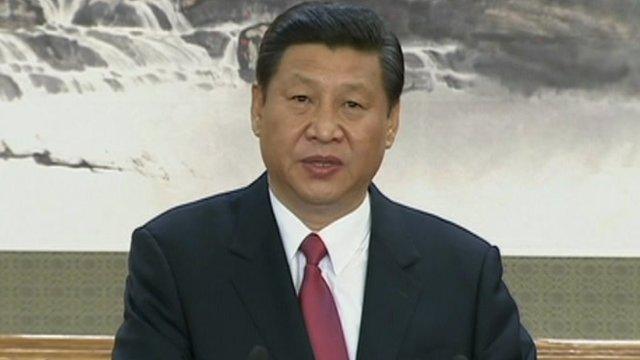Caught in the crosshairs of China's corruption campaign
- Published
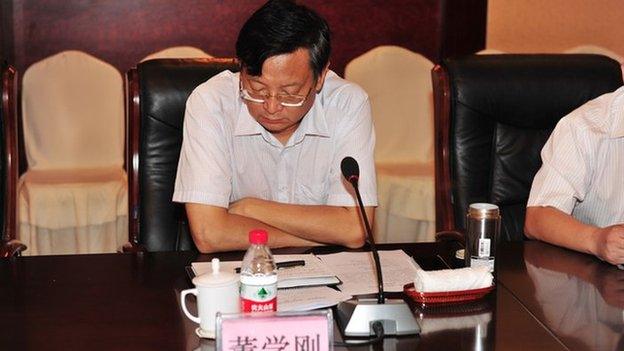
Dong Xuegang jumped to his death in September after being questioned about corruption
To China and the world, Dong Xuegang is just a number.
Data are incomplete, but suggest the suicide rate among Communist Party and government officials may be 30% above the rest of China's urban population.
Experts say this is due to the pressure of President Xi Jinping's anti-corruption battle.
Until the morning of 14 September, Dong Xuegang was not a suicide statistic but a 51-year-old middle-ranking official in the city of Yuncheng, Shanxi, with a wife and child, and a life as three-dimensional as any of us.
Then he jumped to his death from his 9th floor window.
The night before he had been interrogated by the Communist Party's corruption investigators, reportedly about allegations that he had received bribes from real estate developers and had paid his superior a bribe for a promotion.
Suddenly finding himself in the crosshairs of Xi Jinping's mission to rescue the Chinese Communist Party must have been a terrifying experience if it made Dong Xuegang feel he'd rather be dead.
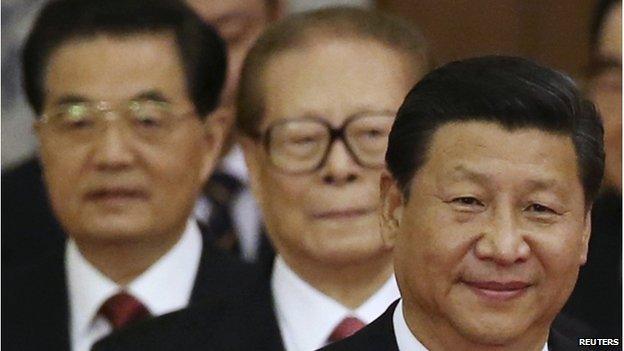
Xi Jinping (R), pictured with former leaders Jiang Zemin and Hu Jintao, has vowed to stamp out corruption
Mr Xi has promised zero tolerance of corruption among party officials, warning that he is going after "both the tigers and the flies", villains from the top to the bottom of the system.
State media amplify the pressure with a daily drumroll of arrests, investigations, trials and sentences.
The Chinese Communist Party does not express regret for the collateral damage in human lives. Mr Xi has said this is a life and death battle for the survival of the party itself.
Sixty-five years ago, the Communist revolution was welcomed by many Chinese because they saw the Communist Party as less corrupt and more committed to social justice than the Nationalist government which went before.
Now China is one of the most unequal societies in the world and the party is widely reviled as a machine for the self-enrichment of those who control it.
In the two years since he came to power, Xi Jinping has embarked upon a personal mission to rebuild a Communist Party fit to rule in the 21st Century.
Shanxi province is often described as the frontline of China's anti-corruption campaign. The region has got rich on mining and real estate, and so have its party officials. Bribery is simply the way government business has been done here.
But now, from the provincial party secretary and the police chief down, Shanxi has seen a sensational string of arrests. Everyone lives in fear that they might be next.
'End it quickly'
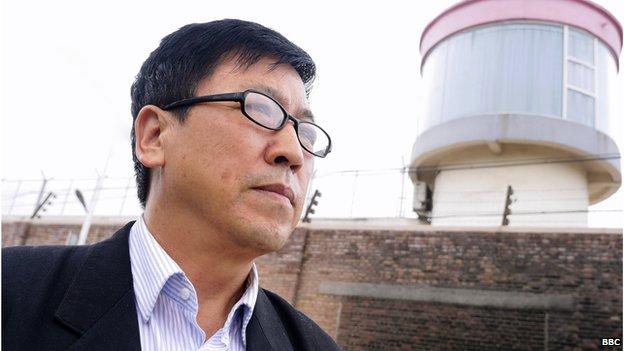
Investigative journalist Gao Qinrong was jailed for exposing a local party chief's corruption
"He panicked." That is the assessment of Gao Qinrong, the investigative journalist who broke the story of Dong Xuegang's suicide jump.
Mr Gao served eight years in jail after exposing the corruption of a local party chief, and he still gets death threats from powerful enemies.
But he says Mr Xi's anti-corruption campaign is working and Dong Xuegang's suicide is part of the proof.
"You'd think death would be a more frightening prospect, but these officials are terrified of losing their fortune and their reputation, and they're also worried that they may be made to inform on others."
"They just can't face living through all that. They prefer to end it all quickly," he said.
Gao Qinrong believes fear can make the party honest. We talked outside the high walls of the Shanxi prison where he served his time, armed guards observing us from watchtowers.
He told me there were now 60 Communist Party officials inside serving sentences for corruption.
He hopes the balance of power between whistle-blowers and party bosses has changed for good and that his own persecutors may be next in line.
"It was a very painful experience being in prison because I knew I was innocent. I even thought about killing myself, but I taught myself to stay strong," he said.
"I told myself I must hold on because I need to fight them to the end. I believe Xi Jinping's policy of zero tolerance for corruption can change things."
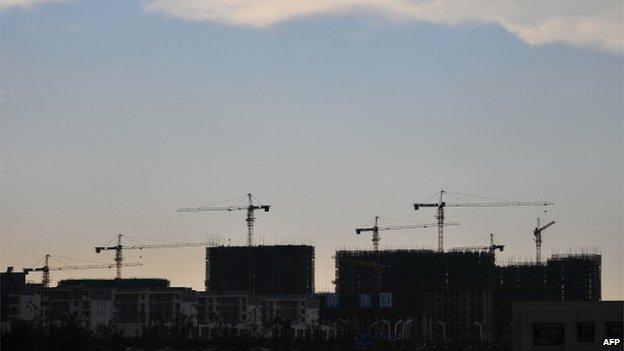
As in many parts of China, Shanxi has seen an increase in construction projects
Herculean task
In Yuncheng city, I take a tour of the new China in the black chauffeur-driven limousine of a Shanxi real estate developer.
As we drive through a forest of high-rise construction projects, he tells me every single one of them has involved bribery of the officials who control land use and the law.
But now the anti-corruption campaign has thrown government into confusion. When everyone has been on the take, who's poacher and who's gamekeeper?
The only difference is scale. Some are more corrupt, some are less, but they are all corrupt.
And so are all the business people who have to deal with them. It's normal practise to give gifts. If you don't, your projects won't go through.
Changing the culture of the Chinese Communist Party is a herculean task. And there are critics who think Xi Jinping is going about it in the wrong way.
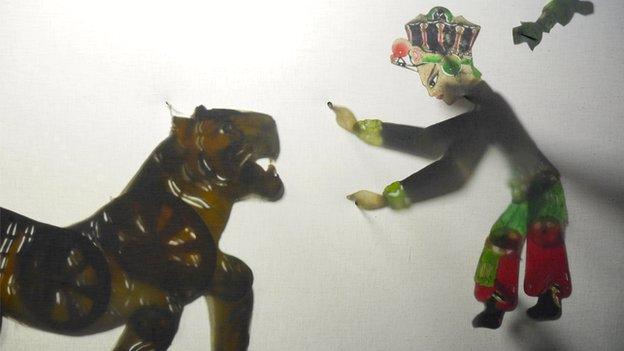
Mr Xi has vowed to catch both "tigers and flies", referring to high and low-level officials
Some party insiders complain that the campaign is too tough, destroying incentives and damaging economic growth. Some suspect he is using corruption as a stick with which to beat his political enemies.
From outside the party, critics point out that Mr Xi talks about the rule of law but runs an investigative machine answerable only to himself.
What's more, his two years in power have seen the imprisonment of lawyers and journalists fighting for greater transparency.
But Professor Wang Yukai of China's Academy of Governance says the critics should suspend judgment because the survival of the Communist Party hangs in the balance and the president has the public behind him.
No one should doubt his resolution. He has tackled corruption from top to bottom, even targeting top leaders.
The corruption is deeply entrenched and without his campaign to remove it, the party will die. This campaign is a shockwave through the system.
As Beijing prepares for a vital policy meeting of the Communist Party leadership this week, battling corruption is still top of the agenda.
This is a ruling party which hasn't yet worked out how to function without its bribery fix.
- Published29 July 2014
- Published29 July 2014
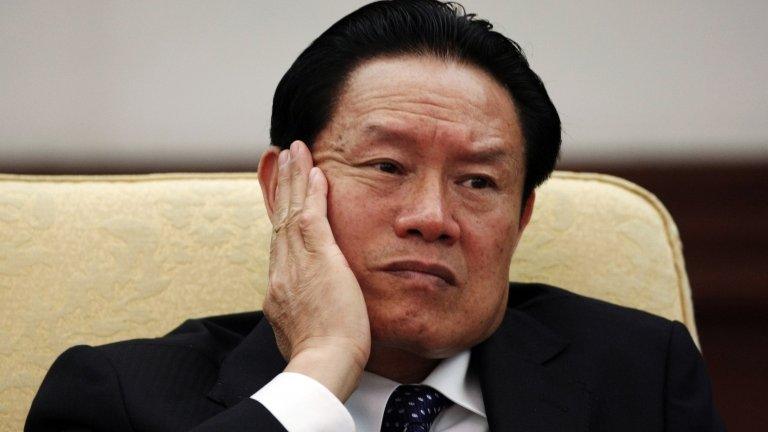
- Published3 April 2014
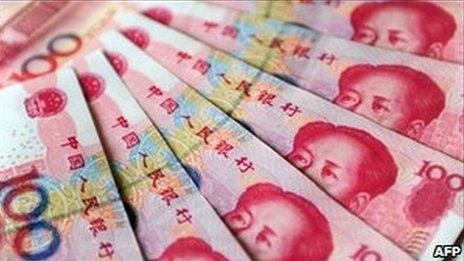
- Published12 October 2015
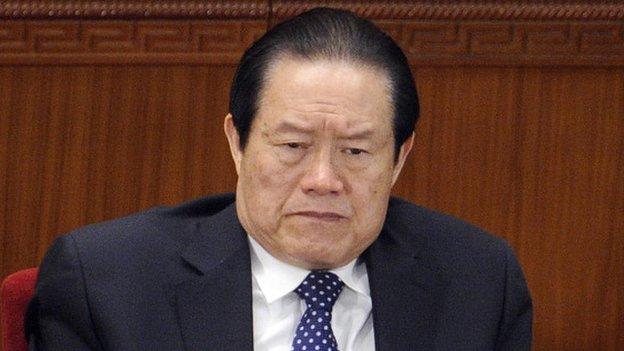
- Published15 November 2012
